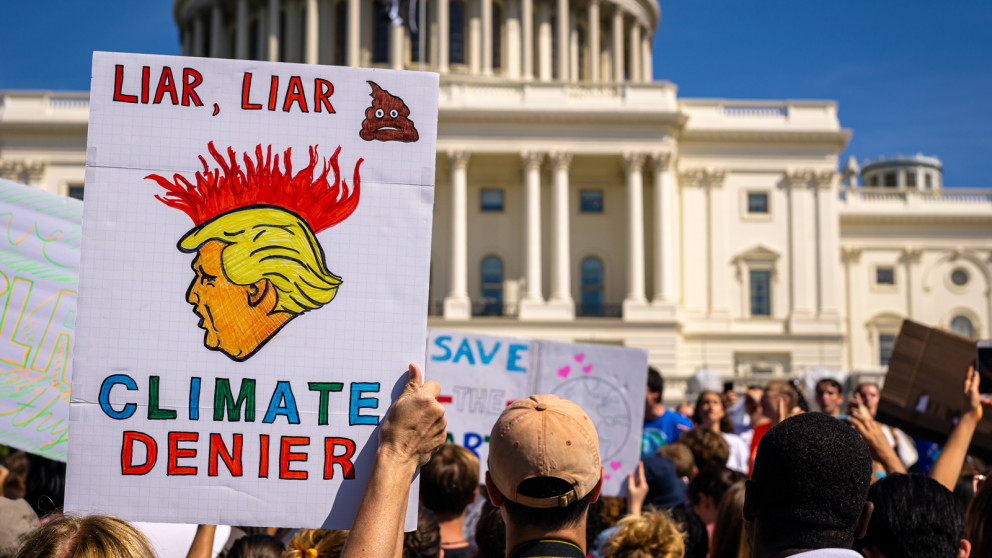Trump, German Government Chaos, and Why We Shouldn’t Lose Hope in Global Climate Politics
19.11.2024

These are dark times for anyone working in the field of climate policy and it’s difficult not to succumb to pessimism. As if the regular reports of record-breaking, climate-driven natural disasters aren’t enough, populist governments and movements are flourishing, putting the brakes on climate policy in countries around the world. The re-election of Donald Trump is an especially alarming development. While President Biden managed to make up for the loss of confidence in US climate policy by pledging to boost climate finance and passing his ambitious Inflation Reduction Act, Trump's election has plunged the global climate science and policy community into uncertainty.
During his election campaign, Trump make a variety of promises (and/or threats) with major implications for efforts to protect the climate. His announcement in the lead-up to the UN climate conference (COP29) in Baku that he intends to again withdraw the United States from the Paris Climate Agreement and possibly even from the UN Framework Convention on Climate Change (UNFCCC) altogether has set the scene for his Presidency. This time around, the US will be able to exit the Paris Agreement relatively quickly – as early as January 2026. Trump was only able to withdraw the United States from the Paris Agreement a few days before the end of his first presidency, as the treaty does not allow countries to give notice of their intention to leave the agreement until three years have passed from the date of its ratification. In addition, the agreement also stipulates a mandatory yearlong waiting period.
Withdrawing from the UNFCCC is likely to prove more difficult, as the US legislature will presumably need to confirm the decision. However, as a non-member to the UNFCCC, the United States would be excluded from any future negotiations, and the Trump Administration might well be reluctant to put itself so squarely on the side-line. Either way, Trump's election signals the emergence of a leadership vacuum at COP29 and it will be far more difficult to reach agreement on the central issues of climate financing, including the New Collective Quantified Goal (NCQG).
Rolling back domestic policy
When it comes to domestic policy, Trump could cause lasting damage over the next four years. He has already announced that he will scrap Biden's Inflation Reduction Act and reallocate funds earmarked to promote green technologies or electromobility, for example. In his desire to unleash a fossil fuel 'renaissance', Trump is championing a narrative of US energy dominance and autarky, and an expansion of (primarily fossil) American energy production under the motto "Drill, baby, drill" - similar to the approach pursued during his first term of office. Investments in fossil fuel infrastructure (pipelines, refineries etc.) and drilling licences will also heighten the United States’ risk of carbon lock-in. The climate news portal Carbon Brief predicts that a Trump Administration will likely add 4 billion tonnes of CO2-equivalent emissions to US emissions by 2030 and cause the United States to miss its climate targets by a wide margin, with emissions expected to fall by just 28% by 2030 instead of the targeted 50-52%.
Assault on science
To make matters worse, Trump's Republican Party enjoys a majority in both houses of the US Congress, enabling it to pass laws with greater ease. Moreover, during his last term Trump was able to fill many positions in the judiciary with people loyal to him (including three members of the Supreme Court). On the other hand, his leadership style and erratic positioning make it difficult to predict what Trump will actually do once he takes power and which interests will ultimately prevail.
But it is a list of proposed measures published in early 2024 by the Heritage Foundation – a prominent right-wing conservative think tank staffed by numerous advisors from Trump's first administration – that has set alarm bells ringing in the climate science community. The proposals include plans to scrap the National Oceanic and Atmospheric Administration (NOAA), which prepares weather forecasts, analyses climate change and much more. Trump also wants to restructure the Environmental Protection Agency (EPA) and severely curtail its powers. His announcements that he intends to scale back US military and financial support for Ukraine and to introduce import tariffs are likely to impact European climate policy and finance, especially if the EU steps in to make up the resulting shortfall in funding or finds itself caught up in a trade war with the USA. Trump’s plans to reintroduce tariffs on steel and aluminium imports are just one example; under Biden’s leadership, the US was edging towards a trade agreement on sustainable steel with the EU. It is clear that Trump's election is a step backwards for global climate policy.
Little cause for optimism in Germany
Unfortunately, there is little cause for optimism in Germany, or indeed in Europe as a whole. Just three years ago, almost all of Germany’s political parties campaigned on the promise to finally tackle the climate crisis. There is little sign of this urgency today. Climate policy has proved a hugely divisive issue and, as the debate becomes ever more polarized, the Great Transformation has ground to a halt. With some political players suggesting that Germany should ditch its ambitions to achieve climate neutrality altogether, the likely future chancellor – Friedrich Merz – has argued on a leading political talk show that wind turbines are an “ugly” transition technology that will one day be replaced by nuclear fusion reactors. Merz’s comments are not only astonishingly misguided, they are dangerous because they assume that, as a society, we are too stupid to make smart decisions about our future. Protecting the climate has dropped down the political agenda. Not only are we now facing at least six months of political standstill, we are also at risk of missing out on the necessary investments in a sustainable future for our economy. All this makes it difficult to find grounds for optimism in Germany.
“There will be chaos and mayhem, but the climate movement will be defiant and continue fighting” Tasneem Essop 6.11.2024 (Pressemitteilung CAN International)
So, why shouldn’t a climate scientist just bury her head in the sand? Is there anything that we can take hope from?
Firstly, it is important to realise that our world is no longer where it was before or during Trump's last term of office. A huge amount of capital has been invested in green technologies and clean energy since then. Millions of people are employed in these sectors today, which means that people – and companies – are making money. In other words, new interest groups have emerged that have an economic interest in pursuing this transformation path. People whose jobs depend on renewable energy or green technologies such as net-zero steel will make it more difficult for governments like Trump's to undo the progress that has been made. Many major corporations and banks have also recognised that climate change poses an existential threat to their businesses (and an insurance risk).
Russia's war of aggression against Ukraine has plunged us into an energy crisis, but it has also made clear the dangers of being overly dependent on energy imports from a single source. China dominates many decarbonisation technology supply chains, but this also means that an enormous amount has been invested in "green growth” there. The first few days of the UN climate conference in Baku suggest that China is keen to assume a global leadership role in climate matters. Ultimately, as the impacts of climate change and the cost of inaction become clearer, people will perhaps be motivated to demand that governments step up and protect the climate. And perhaps Germany’s future chancellor will then realise that nuclear reactors, coal-fired power plants and motorways are not only "ugly" but also harmful to the climate, the environment and human health and the current political blockade will be resolved.
